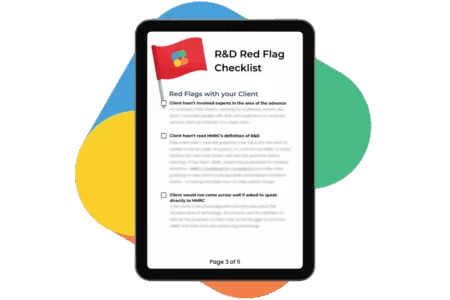Not only is HMRC opening a large number of compliance checks into R&D claims, it’s also taking a very firm line on whether the costs and activities in the claim constitute R&D for tax purposes. Their new default assumption appears to be that they don’t, with caseworkers frequently attempting to deny relief on 100% of the claim’s costs.
While you can certainly argue with how HMRC is trying to raise standards in R&D tax relief, it’s much harder to argue against why they’re doing it. Historically, R&D tax relief was the unguarded underbelly of the HMRC dragon. Many unscrupulous advisors and claimants were attracted to what they saw as easy money, and boundary pushing became a serious problem. Once stories began appearing in the national press about dubious claims, HMRC had no choice but to act and show that they are taking control of a multi-billion pound tax relief.
This is making R&D advisors of all stripes pause and re-consider their approach. Standing out as an unethical advisor is now much riskier than it has ever been. The consequences of acting unethically are that:
- You get increased attention from HMRC – The tax man appears to be risk assessing R&D advisors in much the same way as it risk assesses individual claims. This could be why some advisors are seeing relatively few enquiries, while others are labouring under the weight of dozens. With enquiries being both lengthy and expensive to defend, many advisors are eager to do what they can to avoid them.
- You get targeted by other advisors – Social media can be a dangerous place, particularly when your competition is quick to point out your weaknesses. A growing number of R&D advisors are choosing to differentiate themselves based on their integrity and the quality of their advice, rather than simply trying to hoover up the most leads possible. Using unethical approaches or marketing tactics can end up with your material being used as examples of bad practice – scaring prospects away from your brand.
- It is difficult to shake off a reputation for being an irresponsible or unethical provider – Over time, it can lead to a reduction in leads and repeat customers, meaning you have to take even more risks in your business to compensate. In today’s much more stringent environment, that’s not a viable long-term strategy. It’s a vicious cyclethat ultimately leads to the plughole.
The flip side to all this is that there are significant benefits associated with being – and being seen as – a responsible and ethical R&D provider. Your clients are less likely to receive targeted enquiries from HMRC, your competition will respectfully leave you alone, and you’ll appeal to the growing number of SMEs who are looking for a reputable advisor, rather than a cheap fly-by-night.
The question is – How do you show a cynical world that you’re a reputable and responsible R&D provider? Well, there are a few things to consider.
Firstly, you could invest in specialised training and support (such as responsive helplines) for your R&D team. This not only ensures that your team is at a consistently high level of knowledge, it also helps to differentiate your service from that of your competitors. If you can show prospects that you’re more highly trained and better supported than their other options, it could be a strong motivator in persuading them to sign up with you.
Secondly, you could have your claims independently reviewed by an external and impartial organisation. Sometimes it’s hard to see the wood for the trees, so an outside perspective can spot things you’re too close to see. This extra safety net identifies risks before they become an issue with HMRC and should reduce your enquiry rate over time.
Thirdly, you could consider joining a professional body focused on R&D matters. This gives you access to a network of expert peers. Each of them will be facing the same challenges as you, and there is a good chance they will be willing to share information about HMRC, enquiries, and tips on best practice. This gives you access to the soft information that you won’t find written down anywhere, and it can be an invaluable resource for staying up to date with what other R&D professionals are doing.
At The R&D Community, we believe that standards in R&D tax relief need to be higher, and that advisors deserve more training, support, and help when dealing with an ever more confrontational and draconian HMRC. That’s why we’re working towards developing a professional certification for R&D tax relief advisors. We also have lots of resources available now that can help you manage the risk within your R&D service. Our Red Flag Checklist can help you spot common claim quality issues, and if you have an enquiry to deal with, our guide how to handle an R&D enquiry can help you through it.





